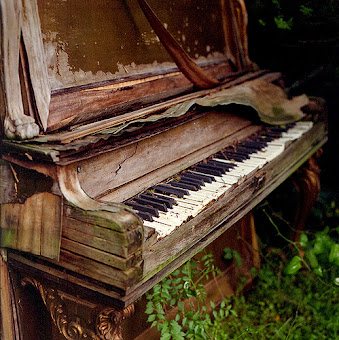Climate
The three most important things to avoid exposing a piano to are moisture, sunlight, and direct heat. Pianos are made mostly of wood, which readily absorbs moisture from the surrounding air. When wood absorbs moisture, it expands. When it releases moisture, it contracts again. The more the wood in a piano "deep-cycles" like this, the more it
causes the piano to go out of tune, wears out the
pinblock and
soundboard, and causes the
action and keys to behave differently.
The best environment for a piano is a constant 68°F and 42% relative humidity. A piano kept free from large temperature and humidity fluctuations will last longer and require less maintenance. As much as possible, protect it from direct sunlight, drafty corridors and rooms, open windows, swamp coolers, room humidifiers, fireplaces, and heater vents. Never keep a piano outdoors, even if protected from the rain and sun!
Piano humidity control systems can greatly benefit a piano in any location by keeping the humidity level constant inside the piano. They are especially suited for pianos in homes that are heated in the winter and pianos in large music venues such as churches, concert halls, and educational buildings. These systems extend the piano's lifespan and reduce the need for
tuning and
regulation.
Cleaning
Like you would any piece of fine furniture, regularly dust the outside of your piano with a soft dust rag. If large amounts of dust accumulate, brush off the majority of it with a feather duster and follow with the dust rag so that the dust won't act as an abrasive. Use only specially-formulated piano cleaning products, such as
Cory®, to clean and polish your piano, as commercial furniture polish may contain substances that soak through the wood and damage the soundboard.
To keep the keys clean, avoid playing the piano with dirty or oily hands, and cover the keys with a
piece of cloth when not in use. If the key tops do get dirty, wipe them off with a soft rag
slightly dampened with water, starting with the white keys and finishing with the black keys. If there are stubborn grease spots, it is acceptable to dampen the rag in mild soapy water.
Be sure not to let any water drip down between the keys. Use a forward and backward rather than left to right rubbing motion to prevent this from happening. If the piano has
ivory key tops, keeping the fallboard open will prevent them from yellowing. When cleaning ivories, don't let any water remain on top of the keys, since the ivory will absorb it, possibly causing the key tops to come loose.
Let your piano technician
clean the inside of your piano, since he will know how to clean around the fragile action parts.
Water and other liquids
Be very careful with liquids around your piano. Water spilled on or inside a piano can swell close-fitting wood action parts, warp keys, weaken glue joints, corrode metal, and damage cosmetics -- requiring major repairs or even ruining the piano. It’s best to find another place to set your drink or vase of flowers.
Fire is also very harmful to pianos.
To preserve the long-term beauty of your piano, avoid letting your piano catch on fire.
↑ Top of page



